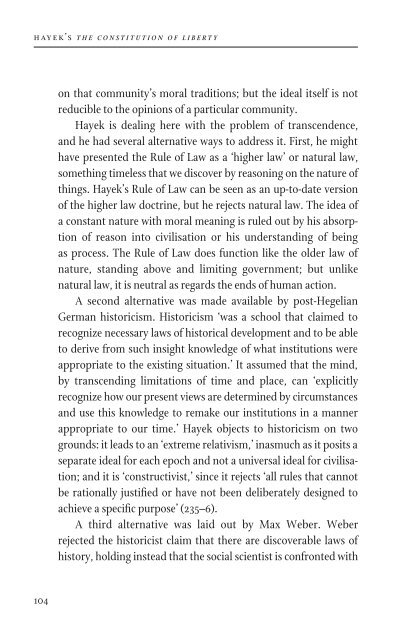Hayek's The Constitution of Liberty - Institute of Economic Affairs
Hayek's The Constitution of Liberty - Institute of Economic Affairs
Hayek's The Constitution of Liberty - Institute of Economic Affairs
You also want an ePaper? Increase the reach of your titles
YUMPU automatically turns print PDFs into web optimized ePapers that Google loves.
h ay e k ’ s t h e c o n s t i t u t i o n o f l i b e r t y<br />
t h e r u l e o f l aw a n d i t s d e t r a c t o r s<br />
on that community’s moral traditions; but the ideal itself is not<br />
reducible to the opinions <strong>of</strong> a particular community.<br />
Hayek is dealing here with the problem <strong>of</strong> transcendence,<br />
and he had several alternative ways to address it. First, he might<br />
have presented the Rule <strong>of</strong> Law as a ‘higher law’ or natural law,<br />
something timeless that we discover by reasoning on the nature <strong>of</strong><br />
things. Hayek’s Rule <strong>of</strong> Law can be seen as an up-to-date version<br />
<strong>of</strong> the higher law doctrine, but he rejects natural law. <strong>The</strong> idea <strong>of</strong><br />
a constant nature with moral meaning is ruled out by his absorption<br />
<strong>of</strong> reason into civilisation or his understanding <strong>of</strong> being<br />
as process. <strong>The</strong> Rule <strong>of</strong> Law does function like the older law <strong>of</strong><br />
nature, standing above and limiting government; but unlike<br />
natural law, it is neutral as regards the ends <strong>of</strong> human action.<br />
A second alternative was made available by post-Hegelian<br />
German historicism. Historicism ‘was a school that claimed to<br />
recognize necessary laws <strong>of</strong> historical development and to be able<br />
to derive from such insight knowledge <strong>of</strong> what institutions were<br />
appropriate to the existing situation.’ It assumed that the mind,<br />
by transcending limitations <strong>of</strong> time and place, can ‘explicitly<br />
recognize how our present views are determined by circumstances<br />
and use this knowledge to remake our institutions in a manner<br />
appropriate to our time.’ Hayek objects to historicism on two<br />
grounds: it leads to an ‘extreme relativism,’ inasmuch as it posits a<br />
separate ideal for each epoch and not a universal ideal for civilisation;<br />
and it is ‘constructivist,’ since it rejects ‘all rules that cannot<br />
be rationally justified or have not been deliberately designed to<br />
achieve a specific purpose’ (235–6).<br />
A third alternative was laid out by Max Weber. Weber<br />
rejected the historicist claim that there are discoverable laws <strong>of</strong><br />
history, holding instead that the social scientist is confronted with<br />
boundless facts <strong>of</strong> experience, from which he must select those<br />
that will give focus to his research. This selection is achieved by<br />
constructing ‘ideal types,’ which are very different from ideals <strong>of</strong> a<br />
moral or aesthetic character. Ideal types, such as ‘capitalism,’ are<br />
indispensable to social science. While they are designed to study<br />
people’s values, they rigorously avoid any value judgements <strong>of</strong><br />
their own or any claim as to what ought to be. Moral and aesthetic<br />
ideals have no place in social science, since they have no rational<br />
or empirical basis whatever. A scholar may decide to become the<br />
advocate for an ideal, but in doing so he leaves science behind and<br />
enters the ceaseless conflict that ‘rages between different gods.’<br />
Weber’s ‘war <strong>of</strong> the gods’ is his characterisation <strong>of</strong> the conflict<br />
between ideals. <strong>The</strong> choice among them is ultimately a matter <strong>of</strong><br />
faith or the individual’s subjective decision (Weber, 2004: 17–31;<br />
Weber, 1949: 17–19, 22–6, 50–59, 89–101).<br />
Hayek greatly admired Weber, especially for denying that<br />
history exhibits discoverable laws and for advocating methodological<br />
individualism in social inquiry. He could not, however, accept<br />
Weber’s conclusion, with its deep Nietzschean overtones, that<br />
ideals lack a foundation, that there is no rational basis for judging<br />
one to be superior to another, and that the decision among them<br />
is ultimately an arbitrary one, based on an act <strong>of</strong> faith or sheer<br />
will – like choosing between God and the Devil. To be sure, the<br />
political philosopher, by Hayek’s reckoning, must not be ‘afraid<br />
<strong>of</strong> deciding between conflicting values.’ He recognises ‘that he<br />
must choose which he should accept and which reject’ (114–15).<br />
Nevertheless, Hayek looks for some foundation for this choice and<br />
refuses to see it as only a matter <strong>of</strong> faith or subjective will.<br />
Hayek’s alternative is to put forward his ideal, the Rule <strong>of</strong><br />
Law, as a meta-legal principle. He does not tell us much about the<br />
104<br />
105












